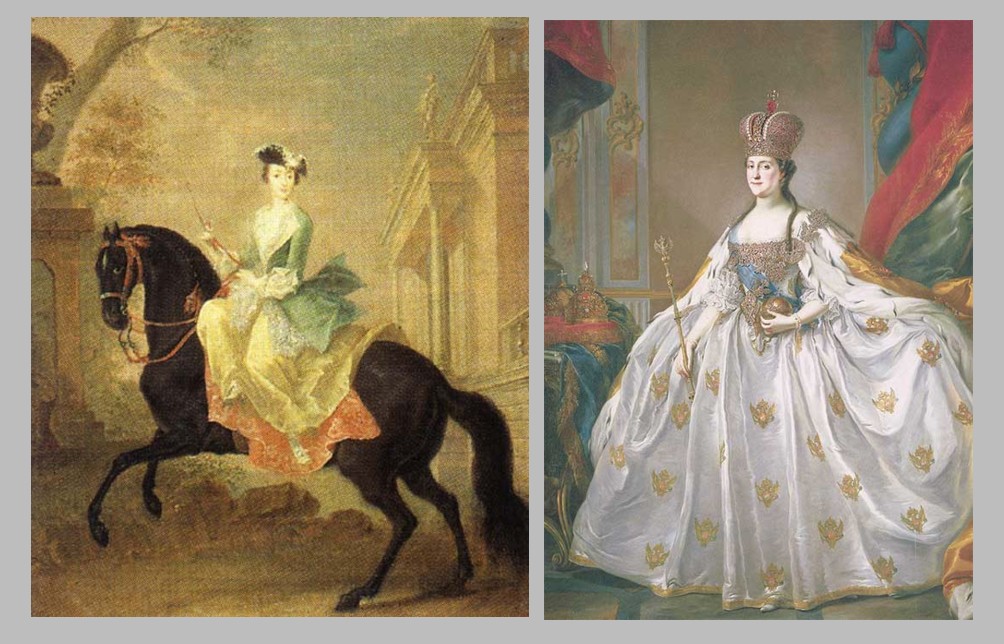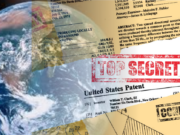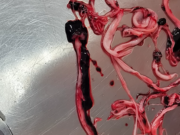
By Julius Skoolafish
“Year after year, Tatar horsemen rode north out of their Crimean stronghold across the grazing lands of the Ukrainian steppe and, in small bands or large armies, swooped down on Cossack settlements or Russian towns to ravage and plunder. In 1662 Tatars captured the town of Putivl and carried off all the 20,000 inhabitants into slavery. By the end of the seventeenth century Russian slaves thronged Ottoman slave markets. Russian men were seen chained to oars of galleys in every harbor in the eastern Mediterranean; young Russian boys made a welcome gift from the Crimean Khan to the Sultan. So numerous, in fact, were the Russian slaves in the East that it was asked mockingly whether any inhabitants still remained in Russia.”
That passage comes from “Peter the Great: His Life and World” by Robert K Massie, a work for which he was awarded the Pulitzer Prize (for Biography) in 1981. Massie noted:
“It was not the Turks whom Sophia and Golitsyn were asked to attack, but their vassals, the Crimean Tatars. Russian fear of these Moslem descendants of the Mongols was deep-rooted.” The Sophia he refers to here is Sophia Alekseyevna, who ruled as regent of Russia from 1682 to 1689 until Peter I (Peter the Great) came of age.”
I‘ve been down the Russian history rabbit hole lately, prompted largely by my concern with current events in Syria. Of course that leads you to present day Russia and President Putin and from there back to the Soviet times [I am currently also reading “Secondhand Time – The Last of The Soviets” by Svetlana Alexievich – WOW!], the Bolshevik takeover, the Romanov dynasty, Rasputin of course [I recommend “Rasputin: Faith, Power, and the Twilight of the Romanovs” by Douglas Smith] and further back to the Times of Trouble.
Then we have Ivan Grozny (“Ivan the Formidable” – the Not-Necessarily-Terrible), the foundation of Russian Orthodox Christianity in Kiev [“Holy Kiev” – now capital of Ukraine] and the very origins of the Rus people themselves. You may be surprised to learn that Russian history is intimately interwoven with the history of Constantinople (‘Istanbul’ after it fell to the Ottomans in 1453) and hence the ‘Eastern Roman Empire” or “Byzantium”. (Moscow is referred to as the Third Rome for good reason.)
As an aside, when Constantinople fell in 1453, the trade route to the East (The Silk Road) was effectively cut off from Europe and this gave considerable impetus to the search for alternative sea routes in the ensuing decades – does 1492 ring a bell?
To add context, a passage from The Encyclopedia Britannica:
“Christianity was apparently introduced into the East Slavic state of Kievan Rus by Greek missionaries from Byzantium in the 9th century. An organized Christian community is known to have existed at Kiev as early as the first half of the 10th century, and in 957 St. Olga, the regent of Kiev, was baptized in Constantinople. This act was followed by the acceptance of Christianity as the state religion after the baptism of Olga’s grandson Vladimir I, prince of Kiev, in 988. Under Vladimir’s successors, and until 1448, the Russian church was headed by the metropolitans of Kiev (who after 1328 resided in Moscow) and formed a metropolitanate of the Byzantine patriarchate.”
But back on topic – this is a snippet on Catherine II (Catherine the Great) – one brief chapter in this long history.
My primary source is “Catherine the Great: Portrait of a Woman”, also by Robert K Massie. He has written a whole series on the Romanovs.
As a companion source, I found the following dramatised documentary most informative and enjoyable, and will show you the video below. — The Romanovs. The History of the Russian Dynasty (Star Media – English)
There are eight 50+-minute episodes in The Romanovs series. Episode 5 is on Catherine. I will show it below.
From the closing moments of that video:
“Catherine kept the title ‘Mother of the Nation’ close to her heart. There was hardly any area of Russian life she didn’t look at to see how it might be improved – from provincial administration to the duties of Russian midwives. Her reign saw the birth of Russian journalism and satire. She even contributed to such magazines herself.
In 1795 she joined forces with Fredrick William of Prussia and Emperor Joseph of Austria to carve up Poland, annexing territory in Belarus, Western Ukraine, Lithuania and Latvia.
She wrote no fewer than three dozen literary works including eleven comedies and seven operas. Her reign saw the construction of great buildings and monuments in Moscow and St Petersburg, designed by men of genius such as Bazhenov and Kazakov. She initiated smallpox vaccination in Russia, vaccinating herself and her son Paul.
She amassed an unrivalled collection of artwork that became the basis of the world famous Hermitage Museum. She was a patron of Russian artists who themselves became masters – Fyodor Rokotov, Dmitry Levitsky and Vladimir Borovikovsky.
The scale and breadth of her achievements were awe-inspiring. No one could doubt her right to called Catherine … the Great.
For Russia, Catherine’s 34-year reign (from 1762-1796) was a period of dramatic growth. The population of the empire soared from 19 to 36 million. The conquests of her reign surpassed even those of Peter the Great. 29 new provinces were created, and 144 new towns founded.
The army doubled in size from 162,000 to 312,000. The navy grew from 6 frigates and 21 ships of the line to 40 frigates and 67 ships of the line. Her generals and admirals won an incredible 78 military victories. Meanwhile, industrial output boomed. The output of cast iron tripled. Russia became the greatest producer of cast iron in the world, overtaking the former world leader, Great Britain.
The value of Russia’s external trade rose from than 9 million rubles per year to nearly 46 million rubles per year. State revenue quadrupled from 16 million to 69 million rubles.
Catherine built on the foundations laid by Peter the Great 80 years before to create a giant and powerful new Russian empire. Many later generations would look back to her reign as the zenith of Russian imperial glory.
But forever mindful of the limitations of power, she compared her own work to a drop of water falling in the ocean.”
Incidentally, in 1770, Catherine’s Russia was engaged in a (yet another) raging war against the imposing Turks at the very moment Captain James Cook was setting foot in Botany Bay – adds some perspective to ‘history’, doesn’t it?. (The history of Crimea and Sevastopol is fascinating! –see more below)
A couple of my favourite passages about Catherine from Massie’s book:
[By the way, Catherine was born a German – she was from Stettin, Germany (now in Poland) – born Princess Sophie Friederike Auguste von Anhalt-Zerbst-Dornburg.]
“Books were her refuge. Having set herself to learn the Russian language, she read every Russian book she could find. But French was the language she preferred and she read French books indiscriminately, picking up whatever her ladies-in-waiting happened to be reading. She always kept a book in her room and another one in her pocket. She discovered the “Letters of Madame de Sévigné” describing life at the court of Louis XIV. When a “General History of Germany” by Father [William Vincent] Barré, recently published in France in ten volumes, arrived in Russia, Catherine read a volume every week. She acquired the “Dictionnaire Historique et Critique” by the French philosopher Pierre Bayle, a seventeenth century philosophical freethinker and precursor of Montesquieu and Voltaire. Catherine read it from beginning to end. Gradually, guided by her own curiosity, she was acquiring a superior education.”
[Interjecting to add context: Sophie/Catherine’s early life from childhood through to young adulthood was marked with rejection and isolation – you have to read it for yourself to appreciate it.]
“To shield herself and to make life bearable, she turned again to books. That winter she read the “Annals” of Tacitus, Montesquieu’s “L’Espirit des Lois” (“The Spirit of Laws”) and Voltaire’s “Esai sur les Moeurs et L’Espirit des Nations” (“Essay on the Manners and Spirit of Nations”)….
[On Voltaire …] Reason, not religion [] should govern the world. But certain human beings must act as reason’s representatives on earth. This led him to the role of despotism and to conclude that a despotic government may actually be the best sort of government possible – if it were reasonable. But to be reasonable, it must be enlightened; if enlightened, it may be both efficient and benevolent …
Catherine, like many of her contemporaries was charmed by Voltaire. …
Here was a philosopher who could teach her how to survive and laugh. AND HOW TO RULE [Emphasis added].”
Making one final connection between Peter the Great, Catherine the Great and Voltaire …. This is from Voltaire in Author’s Preface to “The History of the Russian Empire under Peter the Great” (1759):
“A bookseller orders a book to be written, just as a manufacturer gives directions for weaving a piece of cloth; and unhappily there are authors to be found, whose necessities oblige them to sell their labors to these dealers, like work-men for hire; hence arise these insipid panegyrics, and defamatory libels, with which the public is overrun, and is one of the most shameful vices of the age.
Never did history stand more in need of authentic vouchers, than at this time, when so infamous a traffic is made of falsehood.”
… “insipid panegyrics” – what a great addition to my vocabulary! – thank you Voltaire.
In conclusion, given the timelines and timeframes, one may ask – is Crimea any less Russian than Tasmania is Australian … or Australia is ‘British’?
Now for that video on the Romanovs:
https://www.youtube.com/watch?v=ii7HgNJpkMQ&list=PLwGzY25TNHPBfaoOR3pXw3VyBvmXljeio&index=5
And feel free to explore the StarMediaEN channel for more. For supplementary viewing concerning the events of 2014, I recommend Crimea. The Way Home. Documentary by Andrey Kondrashev.
If I were asked to sum up Peter the Great and Catherine the Great each in a sentence:
Peter (reigned from 1682 to 1725) modernised and westernised Russia.
Catherine (1762 to 1796) brought enlightenment to Russia.
And to think that I only ventured down this Russian history rabbit hole because of the situation in present day Syria!






























That’s what I call a colorful, even dazzling, panegyric. Isn’t Gumshoe lucky to have writers who worry about Syria “in their own way”!
Thank you, Mary. As I intimated, it was Syria that indirectly prompted me to dive down that rabbit hole.
But speaking of luck, how lucky Syria is to have people like Asma al Assad as their First Lady – as was Russia with Catherine.
Here is Asma speaking to a group of women back in 2008 before the US/Israeli ‘coalition’-led
ISIS incursion into Syria. (They [we] were still finishing up in Libya and Iraq at that stage.)
• Asma Al-Assad at a reception for participants in “Follow the Women” / “Women on Bikes” cycling group
https://www.youtube.com/watch?v=oc4ZZ-yXaOQ&feature=youtu.be
Note how [in 2008] she refers to the 1.4 Million Iraqi (2 M in total) refugees who were welcomed and being safely and peacefully accommodated in Syria at that time.
Just over a year ago Asma was diagnosed with breast cancer. The diagnosis was made early and the great news is that after treatment she has been cleared. Here is her first major interview since that treatment just a few weeks ago.
You have to read the subtitles because she is being interviewed in Arabic but I highly recommend going full screen and following along.
https://www.youtube.com/watch?v=RYe4rffV3Dg
The moment at 8:00 is particularly poignant when she talks about her husband being by her side.
She is just a picture of radiance and beauty, both inner and outer. No wonderful the Syrian people love their “Lioness of Damascus”.
Here is Asma as Assad in another rare interview where her qualities are on display.
https://www.youtube.com/watch?v=1ET0eV6hkhE
Ol’ Fish, yer kinda gummin’ up da woiks. We’re supposed to be having a cold war with Russia, aren’t we? And a hot war with Syria. And then you go pulling Catherine out of a hat!
Sorry, Mary – I wasn’t paying attention – too busy looking at the pics
https://russian-faith.com/sites/default/files/users/files/pic/7fe2c2b76f8e61e174e1184c443917b5.jpg
And listening to the music
• Katyusha (Катюшa) – in memoriam Alexandrov Ensemble
https://www.youtube.com/watch?v=XdK4TdluWyE
Aah – those were the days, aye …
• Тамара Церетели – Дорогой длинною (1925)
https://www.youtube.com/watch?v=RjodrgH-gZA
oops – I meant this pic of the day link
https://russian-faith.com/colored-topics/pic-day
A subsection of that links holds this item from Solzhenitsyn, speaking of his “beloved America, my adopted country”:
“It is no coincidence that as Marxist ideologies and secularist principles engulf the culture and pervert mainstream thinking, individual freedoms and liberties are rapidly disappearing. As a consequence, Americans feel increasingly more powerless and subjugated by some of the most radical and hypocritical, least democratic, and characterless individuals our society has ever produced.
“Those of us who have experienced and witnesses first-hand the atrocities and terror of communism understand fully why such evil takes root, how it grows and deceives, and the kind of hell it will ultimately unleash on the innocent and the faithful. Godlessness is always the first step towards tyranny and oppression!”
You could probably get the pix and the tunes together:
.
https://www.youtube.com/watch?v=kkC3chi_ysw
That’s right, go all classy and sophisticated on me – I was tempted to introduce Emerson, Lake and Palmer but let’s bring it down a few more notches …
• Robbie Williams – Party Like a Russian
https://youtu.be/MdYGQ7B0Vew
https://www.youtube.com/watch?v=MdYGQ7B0Vew&feature=youtu.be
https://www.youtube.com/watch?v=bBsKplb2E6Q
Good catch – actually the book I mentioned (Secondhand Time) brings out many related sentiments. It is (so far) a compilation of testimonies and conversations with ordinary Russians who have lived through the collapse of Communism. They talk about living in fear – but that the fear and suffering is what has made them a great nation – they variously love or hate Lenin and/or Stalin et al, and speak openly about their dismay at discovering what had happened during and to their grandparents’ generation when many of the Bolshevik and Soviet era archives were disclosed – with particular reference to Lenin and Trotsky.
Other testimonies talk about how one member of the family was a victim and another an “informer” – yet they have to sit together at the same table on family occasions and reflect that that was just the way it was – history is what it was and they just need to move forward.
They talk about the jokes of the day including (and I believe this was attributed to Ronald Reagan) … “A communist is someone who has read Marx; an anticommunist is someone who has understood him.”
A couple more picture links …
GOLD TRAIN: Amazing Russian Metro
https://ladaray.wordpress.com/2012/01/22/gold-train-amazing-russian-metro/
Famous Landmarks of Moscow I Moscow Subway
https://www.youtube.com/watch?v=7vY1hGtn5XM
Wait until we get to the Hermitage Museum !!
A teaser …
Morpheus and Iris 1811 – Guérin, Pierre-Narcisse. 1774-1833
https://www.hermitagemuseum.org/wps/portal/hermitage/digital-collection/!ut/p/z1/tVRNc5swEP0rzsFHKglJIB9lxcEmsfkqtuHiAUFckgCOzThpfn1FJ0nHTmviactJaN7ue_t2VyAGSxBXyb5YJ01RV8mD-o9iY-VwbiAsoO0Iegm547vUFzMLIgIWPwHwDx-HID6IpwZXlz4mxnwKyeQt_h1gXVmKwBp4ghFHtxjqip-DGMQP1RpEedUeN7LIQDRIsZQZJVqOia4RnWItMWWuZZKgQZpJSWTeomXVbJpvILpPymK3yqs-fKq397tefdtLtk0fQvSlt0mKqimq9a4PsWkQdiz5o6b4M5adAMSnHV20yg8yTK5NleErHTvOXOiCvAJOdaVLZKREmr8AcGwJyIOBmE2Q6ZGRUrEv8icQVvW2VHMStBkXYrrywpGvYj90JDMzatIca2nCoEZoYmptHzSSmTRDjKQI62AMj3lZSIji9VmADIqvff13vGcwHJfFEYNcUGfozpyrkWv82_RWMFNuixtv6N-M3ED_P6511ET_sia7c4UvQWRMPO5xEKNjNYeTZUz1cy341CrbXeOs3rHi7vExVhJlXTX5cwOWZy39pgzDkuFSC5ewcEsRMUwie_8ynGmRffdyW4qUfX89LvjFxQ9oCkPX/dz/d5/L2dBISEvZ0FBIS9nQSEh/?lng=en
Those links are so long – awkward – so I’ll just let you explore the Hermitage Museum yourselves. You can branch out from here
Voltaire Collection
https://www.hermitagemuseum.org/wps/portal/hermitage/digital-collection/!ut/p/z0/rZC9TsMwGEVfJR2y1fhL7FjJaAWpolIIChK0XioTnGISbNd2KLw9ZEL8jIxXurrn6mCBd1gY-aqPMmpr5PSZ94IdWs5ZRmrYtnVxCbztboquvt5ARvGtMniLxbdSwThw6Ahldw3QK7qs6OfTSXAsemuieot4F712bpLGKO_6FJzyYSGi3k6T6hd8SGHWj6zIIEdZiXJUVDmpGEWEIVaiMgNEcsRoQRCt1naQvXqwdlzb6KUJTnpl4tfaciL3Td0csXAyPiFtBot3_0n46eGXrL88jPJFh4MyKZytH0Nih0T6mAKwiyT08-Ti7FUKFAgF7MbNfRnL9zNfrT4AyMJ2Xg!!/
Central Bank of Syria.
World Bank.
Half Syria gold gone, mass poverty from a productive area.
Bashir laughing at Gaddafi when Mo was pointing out the common enemy of the Persian people.
US and Russia playing good cop, bad cop. Then selling military protection.They do this a lot.
North Korea sold them scuds but were they made in USA.
Mmm
Good article Julius.
Boy those Germans Royals get around, one even in the house of Windsor.
Thank you Simon – I am not discounting anything.
At least Damascus still has its opera house
https://www.youtube.com/watch?v=KxRDJKRFEOg
https://www.youtube.com/watch?v=ze9eeMN37Ko
Do you realize what you’ve started Fish? This is fantabulous.
Shame shame on the warmongers.
Everybody, please forgive me on the Mussorgsky, I did not know it was so heavy.
Here get cheered with this. Look at the way the singer (in Syria) is able to get the whole audience to do the work..Wow.
.
https://www.youtube.com/watch?v=1tMTUZRSOyA
Back on Syria – and I think you’ll like this
Maya Youssef – Kanun player performs Syrian Dreams
https://www.youtube.com/watch?time_continue=1&v=xL1QRZ1nfro
She could email that “Song for Peace” to the 535 members of Congress, annotated “Article I, Section 8, Clause 11” and see if they “get” it.
Falling on deaf ears I am afraid – here is ‘our’ definition of peace
Khan Sheikhoun Ghost Town, after liberation
https://www.youtube.com/watch?v=OjWm8pG3LGo
Mosul (Iraq) in ruins
https://www.youtube.com/watch?v=2AVVDFPq_PM
(I could not find the identical video of Raqqa – but we get the idea.)
Some proper listening music
Pyotr Ilyich Tchaikovsky – Hymn of the Cherubim
https://www.youtube.com/watch?v=OPlK5HwFxcw
There’s nothing like a larynx.
Julius you have made my day – feel lighter more expansive– a great post–Thank you. Strangely part of my heritage.
Thank you Diane – I am glad. This calls for a song.
Please go to 54:40 – Kalinka
https://www.youtube.com/watch?v=4vVVgKDR9kM&t=3280s
One of several anecdotes I hope to share:
Reading from Massie (Catherine the Great: Portrait of a Woman) …
“In the summer of 1775, King George III of England requested the loan – the rental, actually – of Russian troops to fight in America against his rebellious colonial subjects. London’s first instruction on this matter came on June 30, 1775, from the Earl of Suffolk at the Foreign Office to Sir Robert Gunning, the British Ambassador [to Russia]:
“The rebellion in a great part of his Majesty’s American colonies is of such a nature as to make it prudent to look forward to every possible exertion. You will endeavor to learn whether, in case it should hereafter be found expedient to make use of foreign troops in North America, His Majesty might rely on the Empress of Russia to furnish him with a considerable corps of her infantry for that purpose.I need not observe to you that this commission is of the most delicate nature. In whatever method you introduce the conversation, whether with Mr. Panin or the empress, you will be careful to do it unaffectedly, so as to give it quite the air of an idle speculation of your own and by no means that of a proposition.”
[end of reading]
“look forward to every possible exertion” – Don’t you just love that phrase! Could one’s intentions to wage war be expressed any more politely?
Where was I … Oh yeah – Catherine said NYET!
I meant to add – did anyone pick up on the fact that this was the first time that Russia ‘meddled with the American democratic process’?
Come on, Gumshoe regulars, let’s do something with this Wesley Clark piece. He says we are going to finish off with Iran. No we are not.
Come on, flex your brain muscles. What can be done? What about cultural ambassadors? Their oud-ists meet our obeo-ists. Anything is better than nothing. Suggestions please.
https://www.youtube.com/watch?v=gTbg11pCwOc
Syria is the new Iraq. The leveling of cities removes cultural attachment and a lot of peeps.
Part of divide and conquer that the ottomans for whatever reason would not do to the collective(Persian) people and their ancient connection. We of course watch this daily as the agenda tries to consume all the culture here.(home and away is not culture.)
Early days but they will build discord between brothers like we see with India and Pakistan.
We can look forward to both countries spending more than they have on security whist getting less every year. Seems the modus of the east India company has folded into the west UN complex.
We should have just left the Semites to their own devices, what a mess.
And as for Mrs Assad going on and on about killing innocent children (second video above), I think she’d have restricted her husband’s privileges if he had done that.
Would have served him right too.
Madeleine Albright – The Price is Worth It
On the deaths of 500,000 Iraqi children in the search for Iraq’s non-existent WMDs
https://www.youtube.com/watch?v=RM0uvgHKZe8
What a mess.
What about this? Tchaikovsky’s “Swan Lake,” done up as only Sydney could do it up — all male. Start at 3 minutes:
.
https://www.youtube.com/watch?v=ChOnhxe-Vm0
I wonder if that is banned in Russia like some scenes (at least) from Elton John’s Rocketman.
https://russia-insider.com/en/elton-john-attacks-putin-removing-sodomy-scenes-his-gay-propaganda-film/ri27368
But we digress.
We can watch Reginald perform here if someone throws down a million pounds.
But if you want to watch a professor explain his endeavours that show the differences to the company line(jobs jobs jobs) that dictates our history or a eminent Doctor that just wants to read and discuss the difficulties, that are self evident and documented by the manufacturers of some enforced medical treatments in this country, forget it.
Russia is fine except for the leaders, just like everywhere is OK except the not so fearless leaders that signed up to the safety.
I know you know Fish, just grumbling.
Been looking forward to this since it was announced earlier this week.
Very topical and you could not find two women more in the spirit of Catherine.
• Eva K Bartlett Sits Down with Russia’s Foreign Ministry Spokesperson Maria Zakharova
• https://ingaza.wordpress.com/2019/09/13/mintpress-sits-down-with-russias-foreign-ministry-spokesperson-maria-zakharova/
• Direct link to the interview on MintPress:
• https://www.mintpressnews.com/russia-foreign-ministry-spokesperson-maria-zakharova-interview/261739/
Anecdote: Mendeleev, the Periodic Table and spiritualism
Who hasn’t heard of the Periodic Table of Elements? … of Dmitri Mendeleev?
Dmitri Ivanovich Mendeleev, a Russian chemist and inventor, was the founder of the Periodic Table.
One little titbit of Russian history which actually gives some profound insight into the socio-religious climate in Russia in the late 19th century and early 20th century is found in Douglass Smith’s “Rasputin: Faith, Power, and the Twilight of the Romanovs” recommended above.
It should be borne in mind that it was into this climate that Rasputin came to prominence – note: INTO, not necessarily AS PART OF it.
I could not explain it better than with this reading from Chapter 11: Demons of the Silver Age.
By way of emphasis I have placed ** before and after words or phrases that are worth drilling down on.
“The turn of the [20th] century was a period of intense spiritual searching in Russia [and elsewhere].
[…]
Emblematic of the age was the Religious-Philosophical Society founded by the writers Dmitry Merezhkovsky, Zinaida Gippius [Merezhkovsky‘s wife] and Dmitry Filospvoc in 1901 in St. Petersburg. They became known as the Bogioskateli – God-seekers. Merezhkovsky fashioned himself into a prophet and wanted to create a new religion based on the idea that the Second Coming of Christ was imminent and with it a new Third Testament.
[…]
“It was the age of Spiritualism, founded in Hydesville, New York in 1848 by the sisters Kate and Margaret Fox, that offered the possibility to communicate with the dead through the help of special “mediums”.
“Spiritualism swept across America, England (Queen Victoria and Sir Arthur Conan Doyle were believers), Germany and Russia, as people flocked to séances to try to make contact with their lost loved ones, their spirits manifesting themselves by rapping, spectral voices, automatic writing, and even ectoplasmic materialization.
So popular did these séances become that the Imperial University in St. Petersburg established the “Scientific Commission for the Study of Mediumistic Phenomena”, led by the chemist
[wait of it – – – ]
Dmitri Mendeleev, father of the periodic table.”
Goodness, by accident (putting ** before and after a word or phrase) I just found out how to add bold emphasis – now that’s spiritual !!
So who taught the elements where to go already?
.
https://www.youtube.com/watch?v=zrqnJP9Urxg&t=66s
Get outta here! See what lack of sleep does? They just don’t make songs/videos like that!
Or this !!
https://www.youtube.com/watch?v=Jkkbci9e9kM
Just saw this, Tesla was also into “muse”. I think the information does come from elsewhere. Few can manage it, of those few most are musicians or artists.
Most people that claim self discovery are claiming what has been given to them, think Bill Gates, Mark Zuckerberg,, all those tech guys really.
Rudolf Steiner really did bring awesome information back and shared it like Dmitri M.
Mendeleev’s table could be used for good or bad. Steiner actually gave away techniques for farming sustainability and without chemicals or elements summed among many other disciplines. The German chemist’s could not have Steiner hanging around.
Thank you so much Simon – this is turning out to be a veritable warren. All information and rants gratefully appreciated.
Thanks for the lead on Rudolf Steiner …
“He based his **epistemology** on **Johann Wolfgang Goethe**'s world view, in which "Thinking … is no more and no less an organ of perception than the eye or ear.“
Off I go …
Cheers Jules,
I just wanted to clarify one part of my above comment, yes the connections/cohorts are endless and fascinating.
Most of the pretenders of interlecual property and just playing along. They do this very well, but it’s a lay up.Libraries have been burnt after the jewels have been hiested for centuries collecting IP.
Sometimes a standalone genius comes along and can actuate a true “paradym shift”, but he/she will be stuck like us in bizzaro world, while idiots like Musk and Kewswel Bezos type collect their acting cheque/paypalcoin for being reprehensible charlitans of an odious nature.
Nite
Anecdote: Peter the Great and Patrick Gordon
Simon’s connection between Steiner and Mendeleev prompted me to recall another passage indirectly connecting Peter the Great with Oliver Cromwell. (We hardly notice contemporaneous people and events when we are reading on any given topic.)
More directly, it concerns Patrick Leopold Gordon (1635-1699) whose story is very much interwoven with that of Peter the Great.
Peter met him in the “German quarter” of Moscow and along with Franz Jakob Lefort they became lifelong companions and friends. Gordon became one of Peter’s staunchest allies and principal advisers.
“Peter was deeply affected with Gordon’s passing and could have surely used him in his ongoing battles with Charles XII of Sweden.”
So how did Patrick Gordon come to be in Russia and become one of Peter the Great’s closest companions and advisors?
“The English Civil War had disrupted Gordon’s youth. His family was staunchly royalist and when [((the well funded))] Oliver Cromwell severed King Chares I’s head, he also laid low the fortunes of all staunch Stuart followers; thereafter, a Scottish Catholic boy had no chance of entering university or finding a useful career in military or public service and, at sixteen, Patrick went abroad to seek his fortune.”
… from Peter the Great: His Life and World by Robert L. Massie
Fish, I am going to ask Mother to take your 11.30pm comment off the board and request a Part Two article from you. I also hereby ask the Norwegian to give us an article on Steiner. He has some strong Aussie protegees (in farming).
Fish, you often mention Syrian girl — I did not know she lives in Oz!! Here she calls out the ADL. ‘Bout time, too.
https://twitter.com/Partisangirl/status/1172309129139933185?ref_src=twsrc%5Egoogle%7Ctwcamp%5Eserp%7Ctwgr%5Etweet
Yes – Maram Susli (also known as Mimi al-Laham) – has been on Insight and does some really great work as Syrian Girl or PartisanGirl. I will come back to Syrian Girl if you like in due course, and we have also spoken about Eva K Bartlett and Vanessa Beeley. There are others, including Senator Richard Black – Virginia.
But for now I just want to bring to your attention another wonderful woman who just refuses to turn her back on truth and humanity.
Carla Ortez
Carla Ortiz: We Have Been Lied To About Syria
https://ahtribune.com/interview/2798-carla-ortiz.html
EXPOSED: Inside the WHITE HELMETS headquarters in Aleppo (Syria)
https://www.youtube.com/watch?v=lKiiKtEcx9Q
At 9:20 – where is that £65 MILLION video featuring Boris Johnson – you may have heard of him …
Oh, here it is …
https://www.youtube.com/watch?v=J2mWdvgCOqs&feature=youtu.be
… Is there a stronger word than ‘deplorable’?
Thank you Mary – as you see fit … Last one for now to add to my 11:30 comment which can be re-posted
I knew I had it somewhere
Catherine’s Instructions (Nakaz) to the Legislative Commissioners for Composing a New Code of Laws (1767)
The Christian Law teaches us to do mutual Good to one another, as much as possibly we can.
Laying this down as a fundamental Rule prescribed by that Religion, which has taken, or ought to take Root in the Hearts of the whole People; we cannot but suppose that every honest Man in the Community is, or will be, desirous of seeing his native Country at the very Summit of Happiness, Glory, Safety, and Tranquillity.
And that “”every Individual Citizen in particular must wish to see himself protected by Laws, which should not distress him in his Circumstances, but, on the Contrary, should defend him from all Attempts of others that are repugnant to this fundamental Rule**.
Read on …
http://www.ctevans.net/Nvcc/HIS241/Documents/Nakaz.pdf
Bravo
Fish, great panegyrc (a public speech or published text in praise of someone or something-sure, I had to look it up) on those “crazy Ruskies”. Glad to see your inclusion of the fantastic doco “Crimea-The Way Home”. Not only does it explain the murderous activities of Western Intel agencies in Ukraine back in 2014 re: The Maidan, but it has great visuals of the region as well as highlighting the decency of the current Russian administration under Putin. I loved how the Crimean bikies assisted Russian military forces to intercept(kidnap) the Ukrainian admiral carrying the written orders for the military commander in Crimea to attack the Crimean citizens. Hilarious! The first five minutes will get you hooked!! Watch it everyone…
https://www.youtube.com/watch?v=c8nMhCMphYU
So much for “Russian Collusion!”
Good of you to highlight that video, Phil. My favourite line is when one of the interviewees is describing how the radical mobs were removed from around the Crimean parliament building and replaced with the armed “polite people”.
The conquest of Crimea and the founding of Sevastopol by (Prince Grigory) Potemkin in 1783 takes us down another burrow, and the story of Potemkin and his relationship with Catherine is a great chapter in itself.
Graham Phillips on Crimea today – for example:
• Artek – Huge INTERNATIONAL Kids’ Event!!
https://www.youtube.com/watch?v=lhHbo8em574
• RUSSIAN BEACH HOLIDAY?? A Day on the Beach in Sudak….
https://www.youtube.com/watch?v=rVEzrKXPDIw
• Crimea Beach FINALE: Ukrainian Girls, Sandy Beach
https://www.youtube.com/watch?v=yhp9vmgYO3s
I just recalled this article by word association
Alexander Zaldostanov – ‘The Surgeon’ – leader of the “Night Wolves” – Russia’s Coolest Christian
https://russian-faith.com/people/russias-coolest-christian-n954